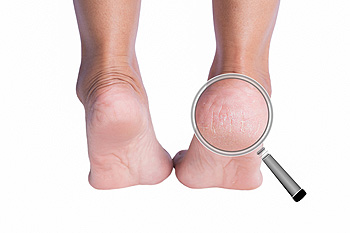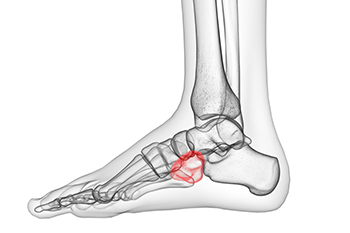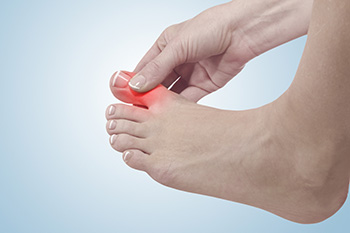January 2023
Cracked Heels and Petroleum Jelly

Cracked heels are a condition that occurs when the heels of the feet do not receive sufficient moisture. As a result, the skin on the heels can grow hard and develop cracks or fissures. There are many treatments that your podiatrist might recommend to treat your cracked heels, which largely depends on your case. One potential remedy that your medical professional might suggest to treat your cracked heels is known as petroleum jelly. This substance will be able to lock moisture into the damaged skin on the cracked heels. The substance is gelatinous in texture and can be used on the skin. One might apply petroleum jelly to the feet by rubbing the jelly onto the feet at night and then wearing socks over the feet to lock in the moisture. If you are unsatisfied with the condition of your feet, contact a podiatrist today.
Cracked heels are unsightly and can cause further damage to your shoes and feet. If you have any concerns, contact one of our podiatrists from Central Ohio Comprehensive Foot Care. Our doctors can provide the care you need to keep you pain-free and on your feet.
Cracked Heels
Cracked heels appear unappealing and can make it harder for you walk around in sandals. Aside from looking unpleasant, cracked heels can also tear stockings, socks, and wear out your shoes. There are several methods to help restore a cracked heel and prevent further damage.
How Do You Get Them?
Dry skin is the number one culprit in creating cracked heels. Many athletes, walkers, joggers, and even swimmers suffer from cracked heels. Age and skin oil production play a role to getting cracked heels as well.
Promote Healing
Over the counter medicines can help, especially for those that need instant relief or who suffer from chronic dry feet.
Wear Socks – Wearing socks with medicated creams helps lock in moisture.
Moisturizers – Applying both day and night will help alleviate dryness which causes cracking.
Pumice Stones – These exfoliate and remove dead skin, which allows for smoother moisturizer application and better absorption into the skin.
Change in Diet
Eating healthy with a well-balanced diet will give the skin a fresh and radiant look. Your body responds to the kinds of food you ingest. Omega-3 fatty acids and zinc supplements can also revitalize skin tissue.
Most importantly, seek professional help if unsure how to proceed in treating cracked heels. A podiatrist will help you with any questions or information needed.
If you have any questions, please feel free to contact one of our offices located in Delaware and Westerville, OH . We offer the newest diagnostic and treatment technologies for all your foot care needs.
Losing Weight and Shrinking Feet

It is common knowledge that obesity and one’s weight are directly tied to the health of their feet. For example, people who suffer from obesity tend to have more issues with their feet because of the extra weight and force they are putting on them each day. Interestingly, if an individual loses weight, they may also notice that their feet will shrink in size. One part of the explanation for this phenomenon is that fat in the feet may be burned when an obese individual loses weight. Additionally, another part of this explanation is that obese individuals typically have edema frequently. This is known as swelling of the feet. When an individual loses weight, sometimes they might notice less swelling in their feet. All of this decreases the size of the feet. If you are concerned about how your weight affects the health of your feet, contact a podiatrist today.
Obesity has become very problematic at this point in time and can have extremely negative effects on the feet. If you’re an obese individual and are concerned about your feet, contact one of our podiatrists from Central Ohio Comprehensive Foot Care. Our doctors can provide the care you need to keep you pain-free and on your feet.
Obesity and Your Feet
Since your feet are what support your entire weight when standing, any additional weight can result in pain and swelling. Being overweight is one of the main contributors to foot complications.
Problems & Complications
Extra Weight – Even putting on just a few extra pounds could create serious complications for your feet. As your weight increases, your balance and body will shift, creating new stresses on your feet. This uneven weight distribution can cause pain, even while doing the simplest tasks, such as walking.
Diabetes – People who are overweight are at serious risk of developing type-2 diabetes, which has a drastic impact on the health of your feet. As you get older, your diabetes might worsen, which could lead to loss of feeling in your feet, sores, and bruises. You could also become more prone to various infections.
Plantar fasciitis – Pressure and stress that is placed on muscles, joints, and tendons can trigger plantar fasciitis, which is an inflammation of tissue that forms along the bottom of the foot.
If you have any questions please feel free to contact one of our offices located in Delaware and Westerville, OH . We offer the newest diagnostic and treatment technologies for all your foot and ankle needs.
Cuboid Syndrome and Taping

Cuboid syndrome is a lesser-known affliction of the foot among the general public. Primarily affecting the cuboid bone at the deep plantar area of the foot, cuboid syndrome occurs when the cuboid bone moves out of alignment. A medical professional may recommend any number of different techniques to treat cuboid syndrome. Taping is one such technique that might be used to treat the condition or mitigate its effects. Taping can be performed by a medical professional trained in foot health such as a podiatrist. A podiatrist performs this by essentially wrapping the foot in medical tape. Specifically, the podiatrist can secure tape on the bottom of the foot by the cuboid bone and wrap the tape around the top of the foot to the ankle. If you believe that you might have cuboid syndrome, contact a podiatrist today.
Cuboid syndrome, also known as cuboid subluxation, occurs when the joints and ligaments near the cuboid bone in the foot become torn. If you have cuboid syndrome, consult with one of our podiatrists from Central Ohio Comprehensive Foot Care. Our doctors will assess your condition and provide you with quality foot and ankle treatment.
Cuboid syndrome is a common cause of lateral foot pain, which is pain on the outside of the foot. The condition may happen suddenly due to an ankle sprain, or it may develop slowly overtime from repetitive tension through the bone and surrounding structures.
Causes
The most common causes of cuboid syndrome include:
- Injury – The most common cause of this ailment is an ankle sprain.
- Repetitive Strain – Tension placed through the peroneus longus muscle from repetitive activities such as jumping and running may cause excessive traction on the bone causing it to sublux.
- Altered Foot Biomechanics – Most people suffering from cuboid subluxation have flat feet.
Symptoms
A common symptom of cuboid syndrome is pain along the outside of the foot which can be felt in the ankle and toes. This pain may create walking difficulties and may cause those with the condition to walk with a limp.
Diagnosis
Diagnosis of cuboid syndrome is often difficult, and it is often misdiagnosed. X-rays, MRIs and CT scans often fail to properly show the cuboid subluxation. Although there isn’t a specific test used to diagnose cuboid syndrome, your podiatrist will usually check if pain is felt while pressing firmly on the cuboid bone of your foot.
Treatment
Just as the range of causes varies widely, so do treatments. Some more common treatments are ice therapy, rest, exercise, taping, and orthotics.
If you have any questions, please feel free to contact one of our offices located in Delaware and Westerville, OH . We offer the newest diagnostic and treatment technologies for all your foot care needs.
Pregnancy and Plantar Fasciitis

Pregnancy can have a variety of different effects on the feet as the pregnant woman progresses through each trimester of her pregnancy. Plantar fasciitis is one risk factor in the feet associated with pregnancy. Plantar fasciitis occurs when the plantar fascia, a band of tissue that runs along the arch of the feet, becomes significantly inflamed. It is common for an individual who is pregnant to demonstrate some kind of overpronation, which is typical because of the increase in weight gained from the pregnancy. Due to the overpronation, a pregnant individual can ultimately stretch their plantar fascia in a damaging way, eventually resulting in plantar fasciitis. Pregnant women should take extra special care of their feet due to the risk factors associated with pregnancy. Also, keeping the feet healthy and strong can ensure that the feet are less likely to cause some kind of fall in a pregnant woman. Contact a podiatrist today if you are pregnant or are planning to be.
Pregnant women with swollen feet can be treated with a variety of different methods that are readily available. For more information about other cures for swollen feet during pregnancy, consult with one of our podiatrists from Central Ohio Comprehensive Foot Care. Our doctors will attend to all of your foot and ankle needs.
What Foot Problems Can Arise During Pregnancy?
One problem that can occur is overpronation, which occurs when the arch of the foot flattens and tends to roll inward. This can cause pain and discomfort in your heels while you’re walking or even just standing up, trying to support your baby.
Another problem is edema, or swelling in the extremities. This often affects the feet during pregnancy but tends to occur in the later stages.
How Can I Keep My Feet Healthy During Pregnancy?
- Wearing orthotics can provide extra support for the feet and help distribute weight evenly
- Minimize the amount of time spent walking barefoot
- Wear shoes with good arch support
- Wear shoes that allow for good circulation to the feet
- Elevate feet if you experience swelling
- Massage your feet
- Get regular, light exercise, such as walking, to promote blood circulation to the feet
If you have any questions please feel free to contact one of our offices located in Delaware and Westerville, OH . We offer the newest diagnostic and treatment technologies for all your foot and ankle needs.
Plantar Warts Can Be Treated!
Gout and the Big Toe

Different toes from the big toe to the small pinky toe can all be impacted by various afflictions of the feet. Gout is one such foot condition that can impact the toes of the feet. In particular, gout can have a specific impact on the big toe. Gout is a specific kind of arthritis that is very common. It is an inflammatory condition that can affect the joints of the toes. When gout impacts the big toe an individual can experience severe, intense pains in the big toe joint. Swelling on the outside of the big toe is also common, as well as noticeable discoloration. Since the big toe plays such an important role in helping individuals walk, gout in the big toe can make motion very difficult. If you are prone to gout attacks and have developed this kind of arthritis in the big toe, it might also be common to experience some kind of swelling. If you are concerned about developing gout in the big toe, contact a podiatrist today for more information.
Gout is a foot condition that requires certain treatment and care. If you are seeking treatment, contact one of our podiatrists from Central Ohio Comprehensive Foot Care. Our doctors will treat your foot and ankle needs.
What Is Gout?
Gout is a type of arthritis caused by a buildup of uric acid in the bloodstream. It often develops in the foot, especially the big toe area, although it can manifest in other parts of the body as well. Gout can make walking and standing very painful and is especially common in diabetics and the obese.
People typically get gout because of a poor diet. Genetic predisposition is also a factor. The children of parents who have had gout frequently have a chance of developing it themselves.
Gout can easily be identified by redness and inflammation of the big toe and the surrounding areas of the foot. Other symptoms include extreme fatigue, joint pain, and running high fevers. Sometimes corticosteroid drugs can be prescribed to treat gout, but the best way to combat this disease is to get more exercise and eat a better diet.
If you have any questions please feel free to contact one of our offices located in Delaware and Westerville, OH . We offer the newest diagnostic and treatment technologies for all your foot and ankle needs.









